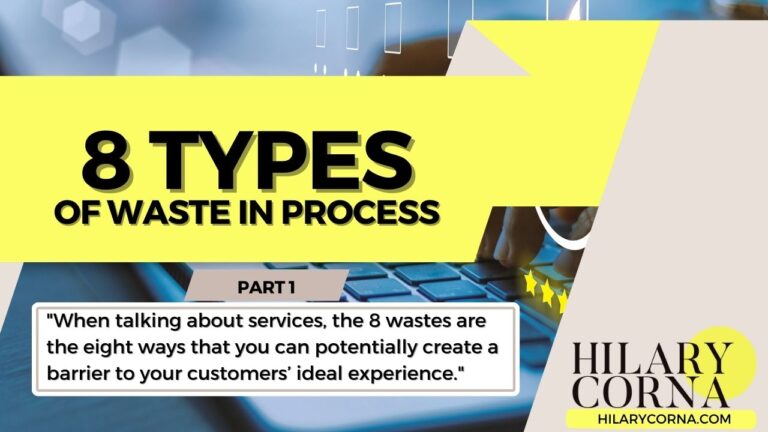In a previous blog, I shared with you how to properly identify the problems in your processes. In my work leading teams through process improvement, it wouldn’t be a surprise if you were able to name a hundred problems.
Facing this number of issues could be overwhelming, especially in a service-based business (non-manufacturing), where it’s harder to track problems. This is where the categorization of problems comes in. This comes straight from the Toyota Production System (TPS).
There’s a term in TPS called the “Eight Wastes”. In this two-part blog series, I’m going to share with you how it relates to services. The “Eight Wastes” are categories in which we frame problems. It helps us brainstorm the types of issues we see in our operations and categorize them better to solve problems better.
When talking about services, the Eight Wastes are the eight ways that you can potentially create a barrier to your customers’ ideal experience. These are the things that block you from delivering on your brand promise. You might have a great vision, amazing branding, and excellent values, but your ability to operationalize them is where you fall short.
#1 Waiting
This type of waste is very straightforward but very interesting. It’s wasted time waiting for the next step of the process. For example, if you have paperwork that is handed off from sales to service for onboarding, and then it waits. That’s waste, also known as inefficiency or being unproductive.
Another form of waiting could be when a customer gets onboarded but doesn’t yet get their first service scheduled. Or maybe the installation is happening during your fulfillment process, and the customer has to wait for someone to arrive. Any type of waiting is a form of waste because it affects the ability to deliver an ideal customer experience.
#2 Motion
Motion is the second type of waste. This refers to unnecessary movements by people. Walking is one of them. During our time at Toyota, we would do time studies of the salespeople. We would find that they’d walk between sets of five to seven miles a day in the dealership, chasing down paperwork. This equated to about two and a half hours a day that they could be selling.
If you’re in a remote office, you might not experience this as much. But if you have any type of supplier or fulfillment operation, you’re going to see a lot of motion wasted there.
#3 Inventory
From a service perspective, inventory waste refers to excess products and materials not being processed. Recently, I’ve been working with a company that does custom software development, specifically for the government space. One of their forms of inventory is staffing. If they keep the software developers on payroll, preparing for a project, that’s a form of waste because they’re being paid but not being used. Inventory can be many different things, not just physical goods or supplies.
#4 Overproduction
If you produce something and it sits, or if you produce more than what is needed, it’s a form of waste. This can be many things in the service industry. For example, in a company I was working with recently that does advertisements for podcasts, one of their forms of overproduction was overproducing coffee. They produce coffee options for the customers, but they realized they were producing too many options. They were spending all this extra manpower, time, and resources to give the customer more than what was actually needed.
Start thinking about how you can categorize your problems
What we are getting at now is thinking about problems in categories instead of just thinking of them as generic organizational problems. All services’ problems fit within one of the eight categories. Solving problems is much easier with categorization.
Stay tuned for next week’s blog for the second part of this blog series, where I’ll discuss the remaining four types of waste in process.
In love and respect,
Hilary Corna














